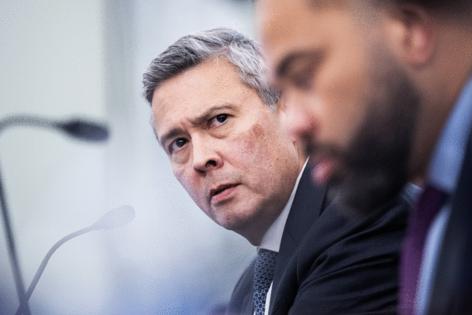Tech execs give qualified backing to 'jawboning' legislation
Published in News & Features
WASHINGTON — Google and Meta officials said Wednesday that they broadly support a push from Senate Commerce Chair Ted Cruz to create greater transparency around government contacts with social media platforms and to allow individuals to sue the government for censorship.
At a committee hearing, the Texas Republican said he is drafting the legislation to introduce “soon” in response to what he said were actions by the Biden administration to “jawbone Big Tech into deleting tweets, down-ranking posts and deplatforming conservatives under the guise of ‘safety and national security.’”
This is the second Commerce Committee hearing on jawboning, or indirect censorship, this month. The first featured individuals who said their content was censored by social media platforms at the direction of the Biden administration.
Cruz said his upcoming legislation will be “designed to provide transparency for when the federal government is urging tech platforms and other companies to censor and to provide for a cause of action to sue the government if and when somebody is censored.”
He pressed the executives, Google’s Vice President for Government Affairs and Public Policy Markham Erickson and Meta’s Vice President for Public Policy Neil Potts, if they would broadly support that kind of legislation, which they said they would, depending on the specific statutory text.
Earlier in the hearing, Erickson took a somewhat measured approach.
“We welcome the committee’s consideration of legislation that would create more transparency in how the U.S. government engages with the industry. And Chairman Cruz, we support, in principle, some of the legislative recommendations from your staff in the report,” he said.
Cruz released those recommendations as part of a report in September. In addition to transparency, they included creating guidelines to “clearly restrict government officials from influencing social media platforms’ content moderation decisions of constitutionally protected speech,” creating a mechanism for platforms to report jawboning, and enacting guardrails to prevent federal artificial intelligence programs from “curtailing speech in the name of addressing so-called harms.”
Erickson said that Google releases data on “government content removal requests” on a biannual basis and that transparency is important to “foster public trust.”
Past actions
Cruz also urged Erickson and Potts to apologize for content decisions and for not speaking out about jawboning.
Potts said that Meta felt “pressure from the Biden administration to censor content related to COVID-19” and that “pressure from any administration would be wrong.”
“We do regret our actions for not speaking out more forcefully against the Biden administration. We made independent choices but we did feel pressure during those discussions,” Potts said.
Erickson, however, said that Google’s decisions are made “independently” and that the company often said no when the administration pressed the company to remove certain COVID-19 information.
“We feel a responsibility to consider when content is flagged but also a responsibility to evaluate that content by our trust and safety teams independently relative to our policies,” he said.
Cruz sparred with Erickson over policies on Google-owned YouTube around claims of fraud in the 2020 election. Cruz said such claims were newsworthy and alleged political bias at Google based on employees’ donations to Hillary Clinton in the 2016 election.
Erickson said that Google implemented its election information policy after states had certified the 2020 vote and eventually relaxed the policy “after the opportunity for real-world harm had dissipated.”
Cruz grew heated as he accused Google of never apologizing or expressing regret, pressing Erickson to “name one” mistake the company has made.
“Mr. Erickson, you’re sitting next to the representative from Meta. If Facebook can say they regret giving in to the Biden administration’s pressure, why is that so difficult for Google?” Cruz asked.
Erickson responded that Google is proud of making its decisions independently.
FCC pressure
Democrats used their questions to air complaints about what they say is jawboning by the Trump administration, including in the case of Federal Communications Commission Chair Brendan Carr’s comments that seemed to threaten television stations that continued to air Jimmy Kimmel’s late-night talk show.
The committee’s ranking member Sen. Maria Cantwell, D-Wash., said she looked forward to the committee setting a date for an oversight hearing with Carr.
“We might have the right hearing but I’m not sure we have the right witnesses,” she said. “We might have the right questions but I’m not sure we have the right administration we’re calling into question.”
In addition to the Kimmel incident, Cantwell expressed her concern over media mergers decreasing the number of news sources available, particularly at the local level, as well as what she portrayed as political conflicts of interest in the FCC’s merger and acquisition approval process.
“When a handful of companies control how information spreads, that makes it easier for any administration to abuse that power with political threats to chill speech,” she said.
_____
©2025 CQ-Roll Call, Inc., All Rights Reserved. Visit cqrollcall.com. Distributed by Tribune Content Agency, LLC.







Comments